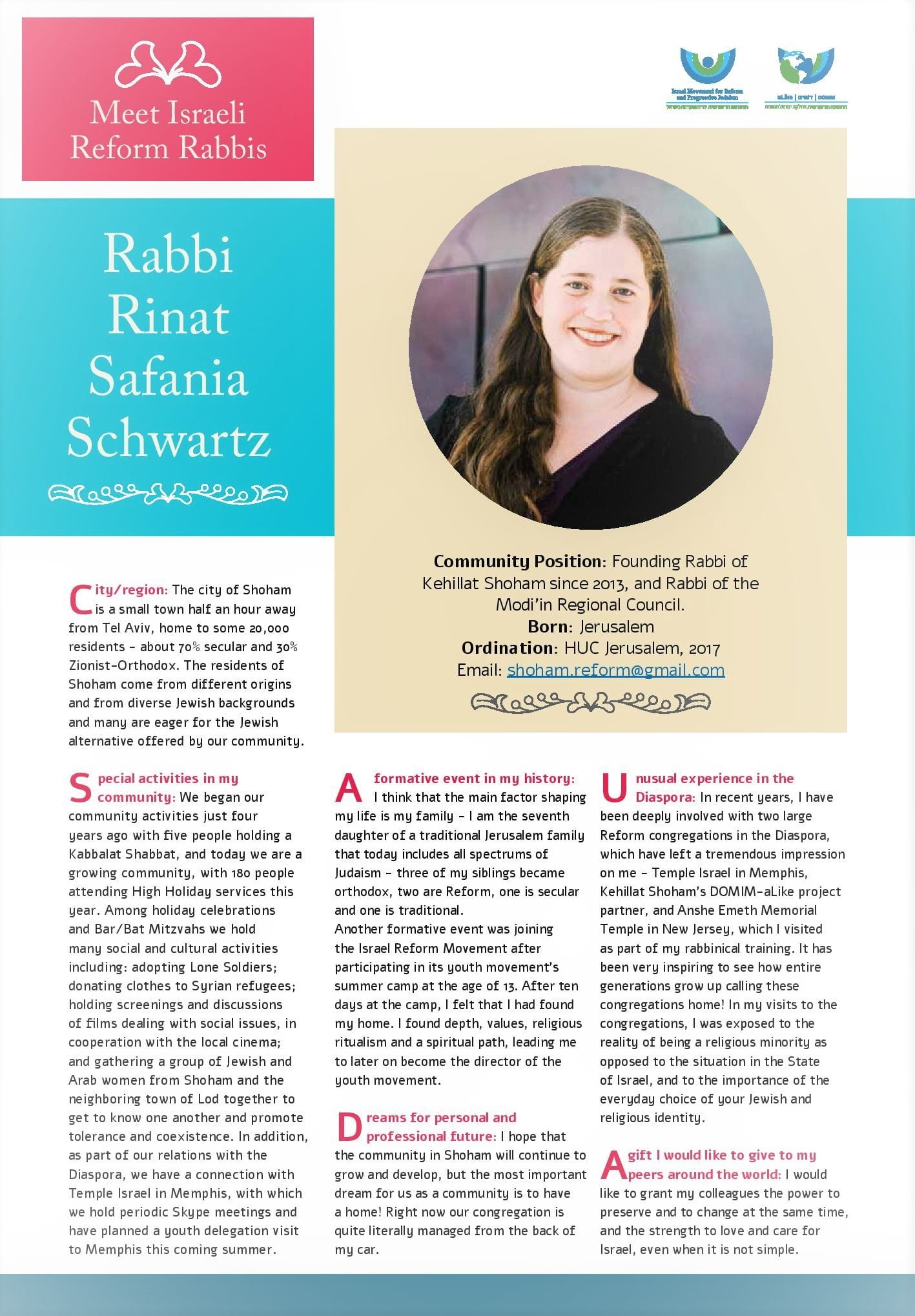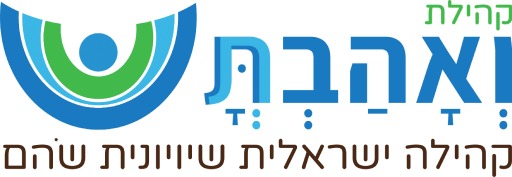A thriving new Reform congregation A Kehillat “Shoham” is a very young congregation, in more than one sense. It was established just 4 years ago, when we first gathered for Yom Kippur services. This was the first egalitarian service ever held in the town of Shoham, a suburb of Tel-Aviv with around 20,000 residents.the majority of congregants at “Shoham” are native Israelis, mostly from a secular background; for many of them, Kehillat “Shoham” is a first experience of progressive Judaism . our congregation is very much involved in social and environmental projects in Shoham and the surrounding area.
We hold egalitarian and musical Kabbalat Shabbat services and other prayers fore Young families . Music in general, and specifically modern Israeli music, plays a central role in our services, where we try to find the right balance between traditional prayers and Israeli songs and poetry.
We offer events for all the holidays in The Hebrew calendar, we have a Bible study group as part of the 929 Project, social action and "gmilut hasadim" – adopting Beit Hachayal' "the Lone Soldier House", Interfaith Activities – Creating a group of Jewish women from Shoham and Muslim women from Lod ,all kinds of other positive endeavors for advancing religious pluralism in Shoham.
With each passing year, we are becoming more precise in the unique contribution our religious community makes to Shoham.
We have an increasing number of Bar and Bat Mitzvah services (more than 30 during 2017), which are hosted in various Reform synagogues, as we do not have an appropriate space to hold them in Shoham. In addition to regular Bar/t Mitzvah study, we also have a unique mothers and daughters study group called At Va-ani – You and I, for Bat Mitzvah girls. a lot of our congregation members have young children and youth .
We invite you to join Kehillat “shoham” as an overseas member. Make Kehillat “shoham” your home away from home throughout the year. Through your membership, you will help Kehillat “shoham” continue to flourish.
“This year I chose to participate in the Yom Kippur service of the Reform Congregation of Shoham. I am not a religious person and the different prayers don’t really speak to me. With that, the poetry, the melodies and songs are familiar to me from my grandfather’s and father’s home, and there is something about them that touches me and is moving. This year I was particularly moved by participating in prayer led by two women. Rina Tzfania, the congregation’s rabbi, and Shani Ben Or – the cantor who worked wonders with her voice and her song. The traditional liturgy was accompanied by contemporary readings, and songs, as Rinat added her own explanations adding a personal layer to each person there. For me, Yom Kippur ended with a sense that it is entirely possible to connect the old with the new, to bridge between beliefs and worldviews, between men and women, between religious and secular, between peoples and cultures – that here it could be different.
A deep personal thanks to Rinat Tzfania, to Shani and to the members of the Shoham Reform Congregation.”
Galit Dekel, Resident of Shoham
Owning it in Shoham
By Rinat Tzfani
This year, Yom Kippur services reached a high point of activity as I have served the past year and a half as the student rabbi in the town of Shoham. As we have no “home” (building) we have been wandering form place to place, and this year Yom Kippur services took place at the Shoham community youth center, which demanded our great creativity in order to turn it into a meaningful prayer space. I led the services together with the wonderful cantor Shani Ben Or. Over 130 men and women joined us, sat intermingled and prayed with a variance of nusach – Piyyutim (liturgical poetry) niggunim – Sephardic and Ashkenazic, traditional and contemporary. We provided a supplementary packet of Hebrew/israeli readings, expressions and poetry which demonstrated a clear continuity of Jewish creativity over the ages, and can roll off the tongue of those familiar with modern Israeli culture. I focused my sermon on the importance of Jewish education and taking ownership of our Jewish identity as I have come to be acquainted with the particular story of community in Shoham.
Shoham is a classic Israel story of a town of 20,000 residents with an upper-middle class socio-economic level. 69% of Shoham’s residents define themselves as secular, and 31% define themselves as religious or traditional. Why do I claim that this is a classic case of the challenges of Israeli Jewish identity? Because, when David Ben Gurion, “handed over the keys” for all matters of religion in the State of Israel (including marriage, divorce, etc) to the Orthodox establishment, so did the council of Shoham “hand over the keys” for all matters of religion to the Orthodox under the leadership of Rabbi David Stav, head of the Tzohar (https://www.tzohar.org.il/English/) rabbinical organization and a previous candidate for Chief Rabbi.
While there is no distinct religious council in Shoham (as there are in other cities), the municipal department of religion under the supervision of Rabbi Stav, championed the notion that it was upon them to answer all religious needs for all residents of Shoham, whoever is in need. However, at the same time, Rabbi Stav spoke with pride to the public that “in his community” 100% of the restaurants were Kosher, no stores open on Shabbat, and that Shoham was the only city in Israel without a Reform synagogue.” There are no Reform synagogues.
There is no Reform synagogue because he has decided that there is no need and he has the authority to provide for all religious needs for all residents. But , this simply isn’t the case. Four years ago a group of families turned to the Reform movement and requested that they send someone to lead egalitarian Yom Kippur services. The Reform Movement sent someone, and despite the expected opposition from the Orthodox, it was quite successful. In light of the success, there was an attempt to continue activity throughout the year, but due to the significant opposition that presented difficult challenges, the activity of Kehilat “Yesh Me’ayin” slowly faded away. However, the need in Shoham remained and the Reform Movement decided that despite the difficulties we are not throwing up our hands. Today, after a year and a half of working in Shoham, I can clearly say that without the Reform congregation, there is no good place for an egalitarian and pluralistic religious expression – there is no official provision for the residents who are seeking out egalitarian prayer and service, there is no good place for women in prayer, there is no real and critical discourse on issues of religion and state, and there is no place for the LGBT community. The history in Shoham shows that any initiative to create a Conservative congregation or a “partnership” style Orthodox minyan will face great challenges, “sticks in the spokes” and great barriers.
My sermon was dedicated to those who made the choice to show up out identification with the notion that we must return ownership of Jewish identity to the people of Israel and to dispel with the feeling of being a guest in their own home. It is essential that secular Israelis who have been too used to letting others take responsibility for their Jewish identity, must stop relating to Judaism as a “museum”’ and must stop being afraid of “holiness”, and they should know that they can touch it, feel it, and create from within. This is their home, and with that they must walk around it comfortably and ‘make themselves at home.’ What more, they must hand this feeling down to our children. To create for them meaningful Jewish experiences that express equality and values. After the difficult summer in Israel we must grow closer to our roots and to not let the extremists speak on behalf of Judaism – on the contrary. It is our responsibility to determine which Judaism we want to live. “Thou shall not murder” was commanded to us all, to all human beings, Jews and non-Jews, just as it was commanded “You shall not hate your brother in your heart,” and specifically “love your neighbor as yourself.”
Throughout Yom Kippur we held two study times, childrens’ activities, and a boisterous and crowded Neilah service.
This Yom Kippur, and the many attendants who were so moved and delighted, proved to us that the determination, the PR, and strong belief along the way despite the great challenges show that the need for pluralism in Shoham is great. The euphoric feeling only continued during the egalitarian Hakafot of Simhat Torah. There, over 70, men, women and children danced and sang, enjoyed a variety of melodies and customs from different traditions climaxing in a communal aliyah to the Torah. My heart was warmed once again by all those coming to share with my their excitement over having danced with the Torah for the first time in such a warm, inviting, inclusive atmosphere that gave them true “Simcha”.
We wish to continue to strengthen the congregation in Shoham, throughout the year, and for fewer struggles over our existence here, and for a great part to wish a renewed sense of ownership over our Jewish identity.

